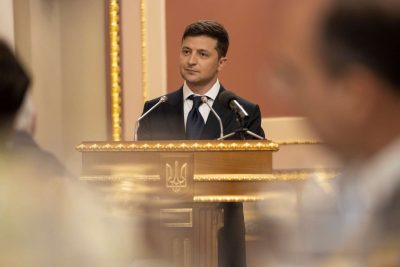Biden Insists Russian Invasion “Distinctly Possible” Despite Troop Demobilization

All Global Research articles can be read in 51 languages by activating the “Translate Website” drop down menu on the top banner of our home page (Desktop version).
To receive Global Research’s Daily Newsletter (selected articles), click here.
Visit and follow us on Instagram at @globalresearch_crg.
***
The Russian troops that took part in defense exercises in Belarus and Crimea are now returning to their barracks, contradicting widely circulated reports that Russia is about to invade Ukraine. Although Moscow repeatedly stressed that troop mobilizations were for defense exercises, a weak and unverified intelligence leak disseminated across Western media claimed that Russia would invade Ukraine on February 16.
Doubling down on the weak leak about the imminent invasion, Western media even missed the sarcasm of Ukrainian President Volodimyr Zelensky when he referred to the report. Not realizing Zelensky’s irony, Western media reported his “confirmation” about Russia’s February 16 invasion day.
When being interviewed by Die Welt, Russia’s ambassador to the EU Vladimir Chizhov sarcastically said:
“Wars in Europe rarely start on a Wednesday.” For his part, Russian President Vladimir Putin said on February 15, “Do we want this [war] or not? Of course not.”
After weeks of propagating about an inevitable Russian invasion of Ukraine, news of troops being demobilized from the border region with the end of exercises disappointed even the most eager war mongers. It was hoped that the Russian invasion narrative would at least provide justification for harsher economic sanctions.
Yet, despite the withdrawal of Russian troops following the end of the exercises, US President Joe Biden is attempting to maintain the invasion narrative. Biden said he would “give […] diplomacy every chance,” but provocatively added that Russian forces remain “very much in a threatening position” and that “an invasion remains distinctly possible.”
With Biden seemingly unrelenting on letting go of the imminent invasion narrative, the situation surrounding Ukraine still remains dangerous and volatile despite Russian troops demobilizing. Ukraine, without intervention from the Organization for Security and Co-operation in Europe (OSCE), continues to deploy its armed forces along the Line of Contact with Donbass. So long as the Ukrainian military threatens to reignite the war in Donbass, whether there is a Russian troop presence on the border or not, the West will maintain a narrative that Moscow is the aggressor.
None-the-less, Zelensky is left with little choice but to continue on this path. Time magazine reporter Simon Shuster, tweeted on February 14:
“Source close to Zelensky told me the US first warned his team of a Russian invasion last fall, putting the chances at 80%. The Ukrainians didn’t buy it, but they saw an opportunity – ‘more aid, more attention’ — and played along. Now they have regrets. Too much attention.”
Yet, Western thinkers, such as Professor Jorge Guira in writing for The Conversation, are attempting to twist the narrative and argue that “it’s possible this whole tense affair may be a bluff to weaken the Ukrainian economy and sow European discord.” This argument ignores the near daily statements from Moscow that stressed there were no plans of invading Ukraine. However, now it is claimed that this whole crisis was manufactured by Russia to target Ukraine’s economy and create division within the EU.
This line of thinking not only disregards Russia’s continued statements that it has no intentions of invading Ukraine, but also ignores that there are no such divisions in the EU, with only the three minnow Baltic states and Poland breaking consensus. These four countries hardly represent the 27-member bloc, or its two most important countries – France and Germany.
As has already been heavily scrutinised, the Ukrainian economy is actually the biggest loser because of the incursion narrative which Kiev helped concoct and promote. With the unintended and unforeseen economic consequences of the Russian invasion allegations, US Secretary of State Antony Blinken announced on February 15 “a sovereign loan guarantee to Ukraine” of up $1 billion to support the country’s economic reform agenda and continued engagement with the International Monetary Fund (IMF).
“This offer – combined with the strong partnership between Ukraine, the IMF, other international financial institutions, the G7 and other bilateral donors – will bolster Ukraine’s ability to ensure economic stability, growth, and prosperity for its people in the face of Russia’s destabilizing behavior,” Blinken said.
In turn, Ukrainian Foreign Minister Dmytro Kuleba said on Twitter “another call with Blinken. We keep actively coordinating efforts to protect Ukraine. Grateful to the US for the decision to provide Ukraine with macro-financial assistance.”
Zelensky allowed the Russian invasion scenario to get out of hand, and what turned into a short-sighted opportunity to get more military aid from the West is now one that has economically indebted Ukraine to the US and under more IMF control. Kiev’s hostilities with Moscow will see it lose billions in transit fees when the Nord Stream 2 gas pipeline is activated, and now its propagation of an imminent Russian invasion sees foreign businesspeople, companies and diplomats flee the country.
None-the-less, even with Russian troops demobilizing after finishing their defense exercises, it appears that the imminent incursion assertions will be maintained, especially as Ukraine continues to provocatively deploy troops to the border of Donbass, with the OSCE remaining silent.
*
Note to readers: Please click the share buttons above or below. Follow us on Instagram, @globalresearch_crg. Forward this article to your email lists. Crosspost on your blog site, internet forums. etc.
Paul Antonopoulos is an independent geopolitical analyst.
Featured image: Zelensky in 2019, photo by President.gov.ua, licensed under CC BY 4.0

